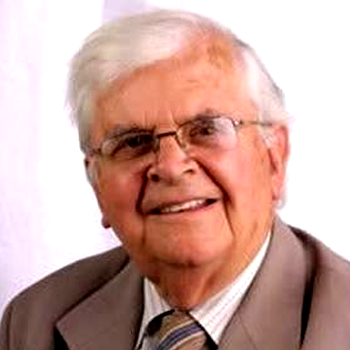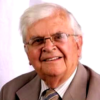Back to series
Aelred of Rievaulx (1110-1167)



Profiles In Faith
Aelred of Rievaulx (1110-1167)
Friend and Counselor
Click here to open a Print - Friendly PDF
Aelred of Rievaulx was born at Hexham, an area considered remote in today’s England, but a rich cultural center of Northumbria in his day. Neither English nor Scottish in its independence, its frontier character enabled Aelred’s family to exert ecclesial influence over both countries as devout and godly priests. With such moral exemplars, it is understandable that priestly celibacy, enforced elsewhere by the Gregorian Reform, was so slow in entering into their realm of influence; it must have seemed unnecessary.
Aelred’s Life
Ethelred was his real name, but adapted to the Normans he became Aelred. Moreover, his Latin name could express being “all or every, counsel.” In a reconciling cultural situation between old and new ways, Saxon or Norman, both the place—Northumbria and Yorkshire—and the man—Aelred—placed him to be “blessed” in peace-making. Becoming a Cistercian greatly helped, for this new reforming order, which we previously discussed in our article on Bernard of Clairvaux, was respected for its new ideals. Aelred was devoted about his friendships, and we would probably have known nothing about him without The Life of Aelred of Rievaulx, written by his faithful friend Walter Daniel. [1] Featured in Aelred’s own book, Spiritual Friendship, Walter Daniel had been his devoted friend for seventeen years.
At the end of his Letter to Maurice, his superior, Walter Daniel describes how near the end of his life, Aelred was suddenly and savagely attacked by a monk who had gone berserk and had cast the frail old man into the hearth fire. Rescued quickly by the other monks standing around, Aelred responded:
No, no, I beg; no, my sons, do not strip your father of the vesture of suffering. I am quite all right, I am not hurt, I am not upset; this son of mine who threw me into the fire, has cleansed, not destroyed me. He is my son, but he is ill. I am indeed not sound of body, but he in his sickness has made me sound in soul, for blessed are the peacemakers, for they shall be called the sons of God’. And then taking his head in his hands, the most blessed man kisses him, blesses and embraces him, and gently sought to soothe his senseless anger against himself, just as though he felt no pain from his own sickness and had been touched by no sadness because of the injury done to him.
Today, we might call this “hagiography,” but there is a memory there that is precious.
From all accounts Aelred seems to have come from affectionate parents and boyhood friendships. Possibly at the age of twelve or fourteen he was adopted into the court of David, King of Scotland, as companion to the king’s son, Henry, and two other stepsons. His life at court expanded into yet other friendships, as well as Norman manners, speaking French, fluent in Latin, and so having ready access to Cicero’s dialogue On Friendship, which remained an abiding literary influence.
With very strong emotional sensibility, he was caught between needing to please others, and yet needing to please God most of all. For at eighteen he was invited by the first Cistercian abbot of Rievaulx, William, formerly a secretary of Bernard of Clairvaux, to join the founding community in 1132. Aelred was torn between remaining with his friends in the Scottish court and going into the woods of north Yorkshire. So he waited two years before he did so. Early he learned that friendships are ambiguous, keeping us from God’s service, as well as deluding our understanding of “spiritual friendship.”
By 1147, Aelred had been elected abbot of Rievaulx, which grew to about 600 monks under his leadership. Over the years Aelred rose to considerable prominence in England, and his counsel was sought out by church leaders and royalty. He corresponded with the Pope and heads of state, was called in to meditate difficult church and political disputes, and was known as “the second Bernard.”
How Aelred Experienced “Spiritual Friendship”
Before entering the monastery, Aelred took great pleasure in Cicero’s On Friendship, for it spoke in natural terms of the delights of friendship. But in the process of his “conversion” to a new way of living as a monk, Aelred read and re-read Augustine’s Confessions. There he learned “what delight had I, but to love and be loved” (Conf. ii, 2). Then Aelred confesses one day, “I found to my surprise that it [i.e., Cicero’s book] did not please me as it used to do. For there was nothing there that had been sweetened with the honey of the beloved Jesus, nothing there seasoned with the salt of Holy Scripture. Without these [Cicero] could not hold my heart.”
About 1142, Bernard of Clairvaux asked Aelred to write his Mirror of Charity. Bernard encouraged his son in the faith to write this treatise as an apologetic for the new monastic way of living in the Cistercian order. In this work, it would be made clear that human relations were not just “natural,” and the craving for love not just a human need. For Aelred, following Augustine’s Confessions, it was forgetfulness of God our Creator, error of mind, and reversal of love in loving self before others that distort our affections and make us miserably frustrated in relationships. As Aelred had once fed on a memory of distinguished ancestral heritage, he now focused on the biblical awareness of being “created in the image and likeness of God.” Because God has created us in love, “our hearts are restless until they find their rest in God.” For the root of love is to will what another wills; it is becoming selfless. To consent then to what God loves and wills is a new orientation, a paradigm shift indeed!
This “spiritual art” is not abstract; it is learnt concretely. We see this demonstrated in how Aelred reacted when he was thrown into the fire by the madman. For twenty-five years, Aelred daily lived what he also taught. It is all about the reordering of our loves, from “concupiscence” (or love of self) to “caritas” (or love of others), drawn by “affectus,” that supreme devotional attachment to God.
Aelred describes progress in loving God as “Sabbath rest.” He identifies three Sabbaths: in the first, the converted conscience is free of guilt, resting in divine acceptance and forgiveness; in the second, growing in love to others, brotherly affection grows and deepens in a peaceful community; third, love of self and love of neighbor lead onward to the love of God as the ultimate object of love, fully resting in God. “Spiritual friendship” is thus “a Sabbath rest” of devotion to Christ. All other relations of friendship radiate from that center at rest.
“God is Friendship”
About 1148, Aelred wrote his first draft of Spiritual Friendship, some five years after the Mirror of Charity. But it was another fifteen to eighteen years before he completed its final draft. Looking back, Aelred interpreted all his life as having been a narrative of friendships: worldly friendships that held him back from his spiritual growth and delayed his monastic calling; then later a ministry of spiritual friendships that enriched his monastic life. So now he can stand back from Cicero, in the light of scripture and of the fathers, to clarify his own life’s journey in the Abraham style of friendship that is in “walking with God.”
In his first dialogue Aelred can now say that “it is clear that Cicero did not know the virtue of true friendship, since he was totally ignorant of its source and object, namely Christ.” [8] Sin, the flaw of all natural friendships, was foreign to Cicero, whereas for Aelred, the best kind of friendship is the one which is growing redemptively and spiritually all the time, in mutual support before God. The context, then, in which Aelred sets “spiritual friendship” is in “taking their beginning from Christ, advancing through Christ, and then are perfected in Christ.” “And so, praying to Christ for his friend, and longing to be heard by Christ for his friend’s sake, he reaches out with devotion and desire to Christ himself. And suddenly and sensibly, natural affection passes into spiritual love, as though touched by the gentleness of Christ close to hand.” Thus, “from that holy love with which he embraces his friend, he rises to that by which he embraces Christ.”
Essentially, what Aelred was now sharing was from John’s Gospel, that “no one has greater love than this, than to lay down one’s life for one’s friends” (John 15:13), as Christ did. Perhaps unique in his teaching, he was affirming a continuum between godliness and the social expression of God’s love in human friendships. Aelred’s friends were quite prepared to believe that one should love one’s friend as one loved oneself. But Aelred contradicts this idea: no, we should have a low regard for oneself, and a high regard for one’s friend. Actually the growth of such a friendship requires the deepening of one’s humility.
What about the difficulty that friendship is full of anxieties, fears, and griefs? It is very difficult at times to keep on being a faithful friend. But Aelred responds by looking at the apostle Paul. Was he a fool to volunteer to carry the burdens of others, to such an extent that he was constantly in pain and afflictions on their behalf? What are the rewards of such pastoral friendships? “Such,” responds Aelred, “has not learned yet what friendship is who wishes any reward other than itself.” The true reward lies not in the human friendship, but in the richer relationship gained in contemplating the love of God. Indeed, states Aelred: “I confess that I am convinced that true friendship cannot exist among those who live without Christ.”
Lacking his Christian convictions, and imposing modern psychological categories of homosexuality and heterosexuality, some gay advocates today want to create Aelred in their image and likeness, as their patron saint. Clearly they do not understand the theological premises in both his books, as Liz Carmichael states so well in Friendship, Interpreting Christian Love. Instead, Patrick McGuire seeks to demonstrate that Aelred probably practiced homosexual acts in the Scottish court, and that later he remained conscious of its dangers. [13] Elsewhere he describes evidences of late twelfth century homosexual practices. [14] John Boswell explored this topic previously, but he implies that our contemporary sexual confusions were similar to previous forms of self consciousness. This is surely historical anachronism in the worst sense. Actually, in his writings, Aelred emphasized virginity for the single and chastity for the married, and he warned of the dangers of both heterosexual and homosexual sin to one’s soul.
We do need to have ethical boundaries in the cultivation of “spiritual friendship.” We may need lots of patience, a forgiving spirit, humility, and much compassion. But Aelred strongly affirms that we can never let a friendship compromise our own moral conduct and damage our souls. For Aelred, five vices are fatal: constant nagging and upbraiding; reproach; pride; leaking confidences; and treacherous wounds. Discernment in the choice of friends is still important when we have a general benevolence of heart for all. To test for faithfulness, to know motivation and discern false motives, to sense the sensitivity of the other, and to appreciate the openness to learn and grow, are all important.
For the last ten years of his life, Aelred was often sick and in pain. Significantly, the last treatise Aelred composed was Dialogue on the Soul, possibly about a year before his death in 1167. It is appropriate, for his mortality was coming to an end, and his body was painfully racked from arthritis. Aelred started his monastic life thinking he was a no-body, “a kitchen hand” no good for anything else. But the love of God has a way of stretching us to develop abilities we never dreamed we might be called to develop. And certainly that was true of Aelred.
As a teacher, he exemplified remarkable openness in allowing his questioners to doubt, to contradict, to hold diametrically opposite views, all in the interests of sustaining friendships. Error he tolerated, pride he could not. Perhaps his greatest contribution is that heaven is all about the communion of saints with their Lord. For when he died, after a painful ten years of suffering, the monk who washed his dead body thought he had never seen a lovelier sight than the beloved Abbot in his final repose. [17] Striking, then, in all the data we have about Aelred’s life is the role of memory, itself a tribute to his friendships.
Notes
[1] Walter Daniel, The Life of Aelred of Rievaulx, ed. and trans. by the late Sir Maurice Powicke, Oxford: Clarendon Press, 1978.
[2] Ibid, p. 81.
[3] For a good historical survey of Aelred’s spiritual formation, see Aelred Squire, Aelred of Rievaulx, and A Study. London: S.P.C.K., 1981.
[4] Walter Daniel, op. cit., (xli), p. 50.
[5] Aelred of Rievaulx, Spiritual Friendship, trans. Mary Eugenia Laker, SSND, Kalamazoo, Michigan, 1977, 1.7, p. 53.
[6] Aelred of Rievaulx, The Mirror of Charity, trans. Elizabeth Connor, OCSO, notes and introduction by Charles Dumont, Kalamazoo, Michigan: Cistercian Publications, 1990, 1.4(10-13), pp. 92-93.
[7] Aelred of Rievaulx, The Mirror of Charity, op. cit., 1.18- 21(51-64), pp. 115-21.
[8] Aelred of Rievaulx, Spiritual Friendship.
[9] Ibid, 2.18, p. 74.
[10] Spiritual Friendship, op. cit., 2.14, p.73.
[11] Ibid, 1.16, p. 54.
[12] Liz Carmichael, Friendship, Interpreting Christian Love, Edinburgh: T.& T.Clark, 2006, p. 98.
[13] Brian Patrick McGuire, Aelred of Rievaulx, Brother and Lover, New York: Crossroad, 1994, pp.49-51, 84-85, 101-102, 129.
[14] Brian Patrick McGuire, Friendship and Community, The Monastic Experience, 350-1250, Kalamazoo, Michigan: 1988, pp. 186-88.
[15] John Boswell, Christianity, Social Tolerance and Homosexuality, Chicago: The University of Chicago Press, 1980.
[16] Aelred of Rievaulx: Dialogue on the Soul, trans. C.H. Talbot, Kalamazoo, Michigan: 1981, p. 23.
[17] Aelred Squire OP, Aelred of Rievaulx, A Study, London: S.P.C.K., 1981, p. 1.

James M. Houston
Professor, CSLI Co-Founder, Senior Fellow for Faith and Vocation, CSLIJames M. Houston is a co-founder of the C.S. Lewis Institute. From its beginning, Jim has served as a Senior Fellow of the Institute, lecturing at CSLI events over the past four decades. He received his Bachelor of Science and M.A. degrees from the University of Edinburgh and a D. Phil. from Oxford University. He was a University Lecturer at Oxford from 1947 – 1971 where he taught cultural and historical geography. While teaching at Oxford, he met C.S. Lewis and participated in a regular Bible study with him for six years. He is known as one of the “founding fathers” of Regent College in Vancouver, British Columbia where he has served as the first Principal, Chancellor and Professor of Spiritual Theology.

 COPYRIGHT: This publication is published by C.S. Lewis Institute; 8001 Braddock Road, Suite 301; Springfield, VA 22151. Portions of the publication may be reproduced for noncommercial, local church or ministry use without prior permission. Electronic copies of the PDF files may be duplicated and transmitted via e-mail for personal and church use. Articles may not be modified without prior written permission of the Institute. For questions, contact the Institute: 703.914.5602 or email us.
COPYRIGHT: This publication is published by C.S. Lewis Institute; 8001 Braddock Road, Suite 301; Springfield, VA 22151. Portions of the publication may be reproduced for noncommercial, local church or ministry use without prior permission. Electronic copies of the PDF files may be duplicated and transmitted via e-mail for personal and church use. Articles may not be modified without prior written permission of the Institute. For questions, contact the Institute: 703.914.5602 or email us.
-
Recent Podcasts
The Side B Stories – Adam Terry’s Story
by Adam Terry, Jana Harmon on April 26, 2024Adam Terry experienced an intellectual crisis of faith....Read More
-
A Welcome Change in Apologetics
by Randy Newman, Aimee Riegert on April 19, 2024
-
Questions That Matter Podcast – Samuel James and Digital Liturgies
by Samuel James, Randy Newman on April 19, 2024
-
Recent Publications
Isn’t Morality Relative?
by Christopher L. Reese on April 1, 2024It is widely accepted in the Western world...Read More
-
Do Muslims and Christians Worship the Same God?
by Andy Bannister on March 1, 2024
-
Artificial Intelligence and Its Impacts on Humanity
by John Lennox on February 13, 2024
0
All Booked
0.00
All Booked
0.00
All Booked
22140
GLOBAL EVENT: Keeping the Faith From One Generation To Another with Stuart McAllister and Cameron McAllister, 8:00PM ET
https://www.cslewisinstitute.org/?event=global-event-keeping-the-faith-from-one-generation-to-another-with-stuart-mcallister-and-cameron-mcallister-800pm-et&event_date=2024-05-17®=1
https://www.paypal.com/cgi-bin/webscr
2024-05-17

Next coming event
Days
Hours
Minutes
Seconds
GLOBAL EVENT: Keeping the Faith From One Generation To Another with Stuart McAllister and Cameron McAllister, 8:00PM ET
On May 17, 2024 at 8:00 pmSpeakers

James M. Houston
Professor, CSLI Co-Founder, Senior Fellow for Faith and Vocation, CSLI
Team Members

James M. Houston
Professor, CSLI Co-Founder, Senior Fellow for Faith and Vocation, CSLIJames M. Houston is a co-founder of the C.S. Lewis Institute. From its beginning, Jim has served as a Senior Fellow of the Institute, lecturing at CSLI events over the past four decades. He received his Bachelor of Science and M.A. degrees from the University of Edinburgh and a D. Phil. from Oxford University. He was a University Lecturer at Oxford from 1947 – 1971 where he taught cultural and historical geography. While teaching at Oxford, he met C.S. Lewis and participated in a regular Bible study with him for six years. He is known as one of the “founding fathers” of Regent College in Vancouver, British Columbia where he has served as the first Principal, Chancellor and Professor of Spiritual Theology.




